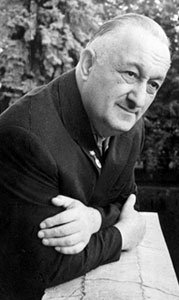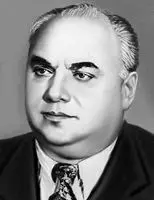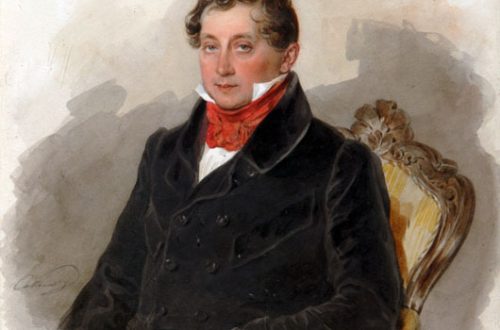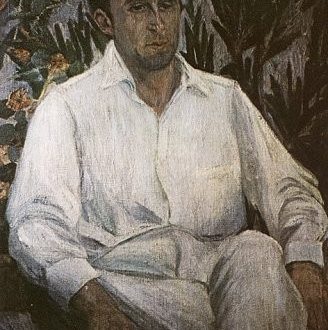
Vano Ilyich Muradeli (Vano Muradeli) |
Vano Muradelli
“Art should generalize, should reflect the most characteristic and typical of our life” – this principle V. Muradeli constantly pursued in his work. The composer worked in many genres. Among his main works are 2 symphonies, 2 operas, 2 operettas, 16 cantatas and choirs, more than 50. chamber vocal compositions, about 300 songs, music for 19 drama performances and 12 films.
The Muradov family was distinguished by great musicality. “The happiest moments of my life,” Muradeli recalls, “were quiet evenings when my parents sat next to me and sang for us children.” Vanya Muradov was more and more attracted to music. He learned to play the mandolin, the guitar, and later the piano by ear. Tried to compose music. Dreaming of entering a music school, seventeen-year-old Ivan Muradov goes to Tbilisi. Thanks to a chance meeting with the outstanding Soviet film director and actor M. Chiaureli, who appreciated the outstanding abilities of the young man, his beautiful voice, Muradov entered the music school in the singing class. But this was not enough for him. He constantly felt a great need for serious studies in composition. And again a lucky break! After listening to the songs composed by Muradov, the director of the music school K. Shotniev agreed to prepare him for entering the Tbilisi Conservatory. A year later, Ivan Muradov became a student at the conservatory, where he studied composition with S. Barkhudaryan and conducting with M. Bagrinovsky. 3 years after graduating from the conservatory, Muradov devotes almost exclusively to the theater. He writes music for the performances of the Tbilisi Drama Theater, and also successfully performs as an actor. It was with the work in the theater that the change of the young actor’s surname was connected – instead of “Ivan Muradov” a new name appeared on the posters: “Vano Muradeli”.
Over time, Muradeli is increasingly dissatisfied with his composing activities. His dream is to write a symphony! And he decides to continue his studies. Since 1934, Muradeli was a student of the Moscow Conservatory in the composition class of B. Shekhter, then N. Myaskovsky. “In the nature of my new student’s talent,” Schechter recalled, “I was attracted primarily by the melody of musical thinking, which has its origins in the folk, song beginning, emotionality, sincerity and spontaneity.” By the end of the conservatory, Muradeli wrote “Symphony in memory of S. M. Kirov” (1938), and since that time the civil theme has become the leading one in his work.
In 1940, Muradeli began working on the opera The Extraordinary Commissar (libre. G. Mdivani) about the civil war in the North Caucasus. The composer dedicated this work to S. Ordzhonikidze. All-Union radio broadcast one scene of the opera. The sudden outbreak of the Great Patriotic War interrupted the work. From the first days of the war, Muradeli went with a concert brigade to the North-Western Front. Among his patriotic songs of the war years, the following stood out: “We will defeat the Nazis” (Art. S. Alymov); “To the enemy, for the Motherland, forward!” (Art. V. Lebedev-Kumach); “Song of the Dovorets” (Art. I. Karamzin). He also wrote 1 marches for a brass band: “March of the Militia” and “Black Sea March”. In 2, the Second Symphony was completed, dedicated to the Soviet soldiers-liberators.
The song occupies a special place in the work of the composer of the post-war years. “The Party is our helmsman” (Art. S. Mikhalkov), “Russia is my Motherland”, “March of the Youth of the World” and “Song of the Fighters for Peace” (all on V. Kharitonov’s station), “Hymn of the International Union students” (Art. L. Oshanina) and especially the deeply moving “Buchenwald alarm” (Art. A. Sobolev). It sounded to the limit stretched string “Protect the world!”
After the war, the composer resumed his interrupted work on the opera The Extraordinary Commissar. Its premiere under the title “Great Friendship” took place at the Bolshoi Theater on November 7, 1947. This opera has taken a special place in the history of Soviet music. Despite the relevance of the plot (the opera is dedicated to the friendship of the peoples of our multinational country) and certain merits of music with its reliance on folk songs, “Great Friendship” was subjected to unreasonably severe criticism allegedly for formalism in the Decree of the Central Committee of the All-Union Communist Party of Bolsheviks of February 10, 1948. Later 10 years in the Decree of the Central Committee of the CPSU “On Correcting Mistakes in Evaluating the Operas” Great Friendship “,” Bogdan Khmelnitsky “and” From the Heart “”, this criticism was revised, and Muradeli’s opera was performed in the Column Hall of the House of Unions in a concert performance, then it was not once broadcast on All-Union Radio.
An important event in the musical life of our country was Muradeli’s opera “October” (libre by V. Lugovsky). Its premiere was a success on April 22, 1964 on the stage of the Kremlin Palace of Congresses. The most important thing in this opera is the musical image of V. I. Lenin. Two years before his death, Muradeli said: “At present, I continue to work on the opera The Kremlin Dreamer. This is the final part of the trilogy, the first two parts of which – the opera “The Great Friendship” and “October” – are already known to the audience. I really want to finish a new composition for the 2th anniversary of the birth of Vladimir Ilyich Lenin. However, the composer could not complete this opera. He did not have time to realize the idea of the opera “Cosmonauts”.
The civic theme was also implemented in Muradeli’s operettas: The Girl with Blue Eyes (1966) and Moscow-Paris-Moscow (1968). Despite the enormous creative work, Muradeli was a tireless public figure: for 11 years he headed the Moscow organization of the Union of Composers, took an active part in the work of the Union of Soviet Societies for Friendship with Foreign Countries. He constantly spoke in the press and from the rostrum on various issues of Soviet musical culture. “Not only in creativity, but also in social activities,” wrote T. Khrennikov, “Vano Muradeli owned the secret of sociability, knew how to ignite a huge audience with an inspired and passionate word.” His tireless creative activity was tragically interrupted by death – the composer died suddenly during a tour with author’s concerts in the cities of Siberia.
M. Komissarskaya





